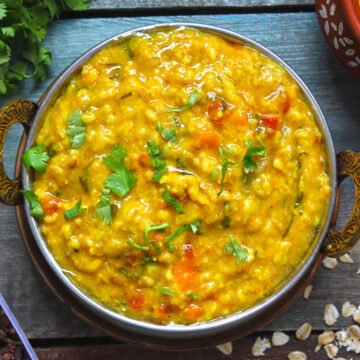
Oats Khichdi Recipe
Oats khichdi is a wholesome and comforting dish made with oats, lentils, and mixed vegetables. Cooked with spices like turmeric and cumin, it's a nutritious one-pot meal that's easy to prepare. This variation of traditional khichdi offers a quick and healthy option, perfect for breakfast or a light dinner, packed with fiber and essential nutrients.
Ingredients
Ingredients:
- 1 Cup Rolled oats
- ½ Cup Moong dal (yellow lentils)
- 1 Small onion, finely chopped
- 1 Small tomato, finely chopped
- 1 Carrot, diced
- ½ Cup Green peas
- ½ teaspoon Cumin seeds
- ½ teaspoon Mustard seeds
- ½ teaspoon Turmeric powder
- ½ teaspoon Red chili powder
- ½ teaspoon Garam masala
- Salt to taste
- 2 Cup Water
- 1 tablespoon Ghee or oil
- Fresh coriander leaves for garnishing
Instructions
Prepare the Moong Dal
- Rinse and Cook: First, rinse the moong dal well under running water until the water is clear. This helps get rid of any dirt. Next, add the rinsed dal to a pressure cooker with 1 cup of water. Cook it for 2-3 whistles until the dal is soft and mushy. Once the dal is ready, set it aside!
Saute the Vegetables
- Heat the Ghee or Oil: First, take a large pan or kadai and heat 1 tablespoon of ghee or oil over medium heat.
- Add the Spices: Once the oil is hot, add cumin seeds and mustard seeds.
- Cook the Vegetables: Next, add the chopped onions and sauté them until they turn golden brown. After that, toss in the chopped tomatoes, diced carrots, and green peas. Cook everything for a few minutes until the vegetables are soft. In fact, the vegetables add both flavor and nutrition to the dish!
Cook the Oats
- Add the Oats: Now that the vegetables are soft, it's time to add the rolled oats to the pan.
- Mix in the Spices: After that, sprinkle in the turmeric powder, red chili powder, garam masala, and salt. Then, stir everything together really well.
- Add Water and Dal: Next, pour in 1 cup of water and add the cooked moong dal. Mix everything together, making sure the oats and dal are evenly combined. You want a nice, smooth mixture!
Simmer and Serve
- Cook the Khichdi: First, cover the pan and let the khichdi simmer on low heat for about 5-7 minutes. During this time, the oats will cook fully and soak up the water. Soon, you’ll see the khichdi getting thicker and creamy. Finally, taste it and add more seasoning if you think it needs it!
- Garnish and Serve: First, sprinkle fresh coriander leaves on top of the Oats Khichdi. Then, serve it hot with a side of yogurt or pickle to make it even tastier!
Notes
Variations
-
- Spice it up! Try adding garam masala, coriander powder, or a bit of ginger for warmth. For extra heat, sprinkle chili powder. A pinch of hing (asafoetida) can also enhance the flavor.
-
- Add Veggies! Include bell peppers, spinach, or zucchini for extra nutrition. Fresh greens like methi or coriander bring a burst of freshness!
-
- Boost Protein! Add paneer cubes, boiled eggs, or cooked lentils for a more filling, protein-packed meal!
-
- Regional Twists! Add coconut and curry leaves for a South Indian touch, or mustard seeds and ghee for a North Indian flavor. Each twist gives your khichdi a unique flair!
Tips for Success
-
- Achieving the Right Consistency: To get the right texture, use a good mix of oats and water. Generally, 1 cup of oats to 2-3 cups of water works well. If you want it thicker, use less water; if you prefer it soupier, add more.
-
- Avoiding Mushiness: To stop the khichdi from becoming mushy, don't overcook the oats. Cook them just until they're tender, which takes about 5-7 minutes. Using rolled oats is best because they keep their shape better than instant oats.
-
- Enhancing Flavor: Start by sautéing spices like cumin, mustard seeds, and turmeric in oil. Then, add the oats and water. You can also mix in veggies like peas, carrots, and beans for extra flavor and nutrition. A squeeze of lemon juice at the end makes it even tastier.
-
- Resting Time: Finally, let the khichdi sit for a few minutes after cooking. This helps the flavors blend together and makes the texture better.
Nutrition
Nutrition Facts
Oats Khichdi Recipe
Amount per Serving
Calories
600
% Daily Value*
Fat
20
g
31
%
Saturated Fat
5
g
31
%
Polyunsaturated Fat
5
g
Monounsaturated Fat
10
g
Sodium
700
mg
30
%
Potassium
1000
mg
29
%
Carbohydrates
90
g
30
%
Fiber
20
g
83
%
Sugar
7
g
8
%
Protein
22
g
44
%
Vitamin A
800
IU
16
%
Vitamin B1
0.3
mg
20
%
Vitamin B2
0.1
mg
6
%
Vitamin B3
3
mg
15
%
Vitamin B5
0.5
mg
5
%
Vitamin B6
0.2
mg
10
%
Vitamin C
10
mg
12
%
Vitamin E
2
mg
13
%
Vitamin K
8
µg
8
%
Calcium
60
mg
6
%
Iron
4
mg
22
%
* Percent Daily Values are based on a 2000 calorie diet.
Tried this recipe?Let us know how it was!